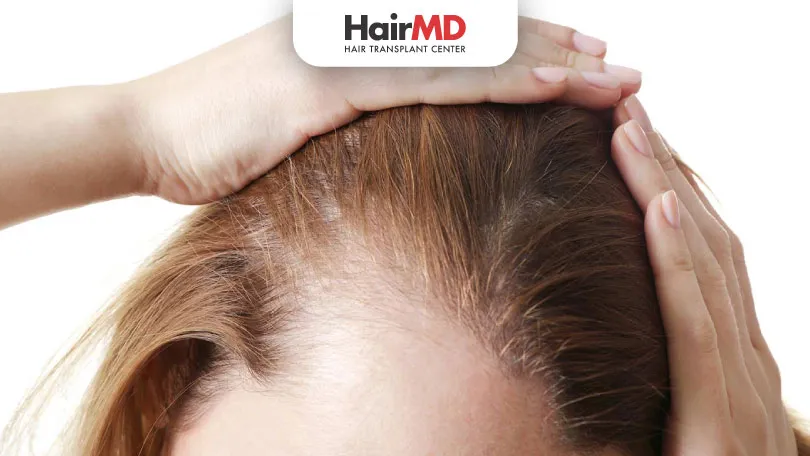
What’s covered in the article?
- Telogen Effluvium Causes
- Telogen Effluvium Symptoms
- Telogen Effluvium Treatment Tips
- Telogen Effluvium Regrowth Time
- Conclusion
Telogen Effluvium Causes
Telogen Effluvium is characterized by disturbances to the hair cycle. Some causes for it include the following.
- Improper Diet: Lack of nutrients like vitamin B, iron, proteins, and zinc can weaken the hair and cause hair loss.
- Severe Stress: Prolonged stress can cause hair loss in about two to three months after the stressful event.
- Menopause: Menopause leads to various hormonal changes that could lead to hair loss, as featured in Telogen Effluvium. Surgeries and medication can also lead to telogen effluvium.
- Metal Allergy: Contact in any form with toxic metals in chemicals can also cause hair loss or hair fall.
- Pregnancy: During pregnancy, a higher amount of hair is in the growth phase for a longer time. Hormonal changes that take place after three to six months of childbirth can lead to hair fall. The phenomenon is termed post-partum telogen effluvium.
- Sudden Weight Loss: Weight loss also has a relation with hair loss. In addition, chronic calorie restriction like the one in Nervosa and anorexia can also lead to hair fall.
Telogen Effluvium Symptoms
Some common Telogen Effluvium symptoms include the following.
- Noteworthy hair loss while washing or combing
- Common hair thinning
- Temporary hair loss
- Losing hair with white bulb and the absence of shiny sheath
- Hair becomes dry, lusterless, sparse, and fragile
- Color change in the hair from dark to brown or red, brown to blonde
Telogen Effluvium Treatment Tips
Telogen Effluvium treatment depends on its cause. Accordingly, here are some Telogen Effluvium treatment tips, including the following.
Note: Consult a dermatologist before you go for any treatment for Telogen Effluvium. It can help you keep side effects away.
- Hair Care: Style your hair appropriately. Avoid curling, dry blowing, or straightening the hair until the condition improves. Also, try to stay away from frequent coloring or hair highlighting.
- Proper Diet: Get a proper diet plan from a dermatologist. Including foods rich in iron, vitamin B6, B12 and zinc can help.
- Reducing Stress: Easier said than done. We know it isn’t easy to avoid stress. But you may indulge in meditation, Yogasan, etc., to cleanse your mind and prevent stress from affecting your well-being.
- Medications: Consult a dermatologist, who may prescribe you OTC medications to foster hair regrowth. The medicine should contain 5% minoxidil, which is a topical product to be applied to the scalp once a day. The product can help prolong the anagen phase.
Telogen Effluvium Regrowth Time
Telogen Effluvium could have a regrowth time of about three to six months after the cause is diagnosed and the treatment starts. But what does Telogen Effluvium regrowth look like? In some cases, the rate of shedding slows down but not entirely. In most cases, people don’t lose more than 50 percent of their hair.
However, if you ask about chronic Telogen Effluvium regrowth time, it could be longer, as it lasts for more than six months, continuing for a few years.
Do You Know?
Nearly 250 Patients Visit HairMD
Everyday For Various Hair Concerns?
(Your journey to healthier and fuller hair starts here!)
Meet Our Dermatologists
Conclusion
Further Reading
Hair Transplant vs Hair Wigs – Pune Specialists Explain
Pune specialists compare hair transplants vs wigs. Learn costs, maintenance & why transplants are better long-term investment. Expert guide from HairMD India.
PRP Therapy for Hair Loss in Pune 2026 – Cost, Effectiveness & Results
Complete guide to PRP therapy for hair loss in Pune 2026. Learn about costs (₹3,000-15,000/session), 70-80% success rates, procedure details, and how it compares to FUE and medications.
Ethical Hair Transplant Practices – Why HairMD Pune Is Trusted?
Discover what ethical hair transplant practices look like and why patients trust HairMD Pune. Learn to spot red flags, verify surgeon credentials, and make informed decisions for your hair restoration journey
Low-Cost Hair Transplant Clinics in Pune – Risks & Warnings
Discover why ultra-low-cost hair transplants in Pune are dangerous. Learn red flags, true costs, and how to verify surgeon credentials before risking your scalp health.
Have thoughts? Please let us know
We are committed not only to treating you, but also educating you.










